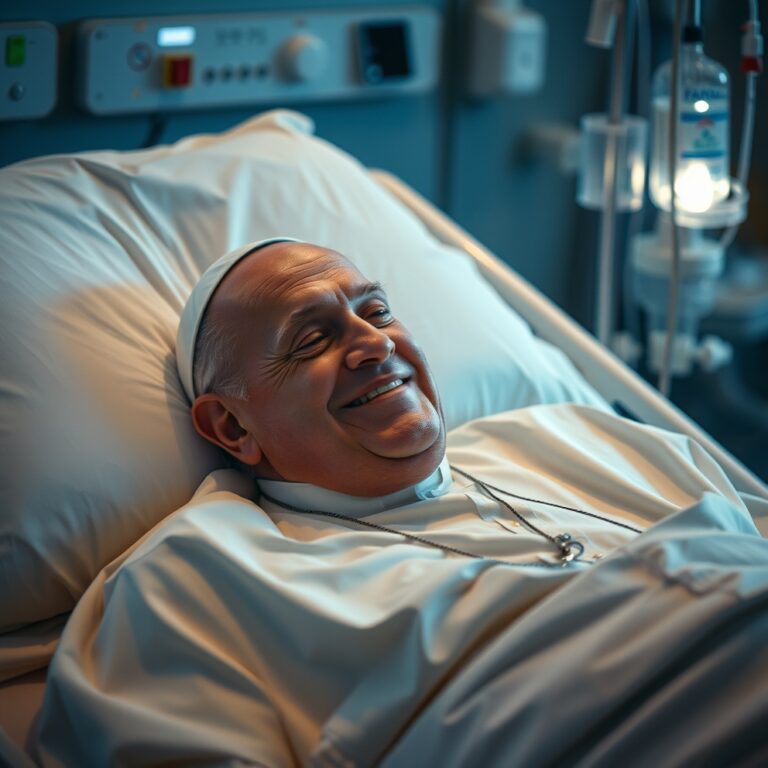
Pope Francis Blasts Trump’s Deportation Plan as a ‘Disgrace’ to Humanity
In a scathing rebuke, Pope Francis has labeled Donald Trump’s plan to deport millions of undocumented immigrants from the United States as a “disgrace.” The Pope made his comments in an interview with an Italian TV program, where he expressed his deep concern about the impact such a policy would have on vulnerable migrants.
A History of Advocacy
Francis’ remarks are particularly significant given his history of advocating for migrant rights. In 2016, before Trump’s election, the Pope criticized Trump’s promise to build a wall along the US-Mexico border, saying that “a person who thinks only about building walls… and not of building bridges, is not Christian.” This statement was met with widespread criticism from Trump supporters, but it also highlighted Francis’ commitment to protecting the rights of migrants.
Migration in Europe
The Pope also touched on the issue of migration in Europe, saying that there was “a lot of cruelty” in how migrants were being treated. He emphasized that everyone has the right to emigrate and that a well-thought-out migrant policy could benefit countries like Italy and Spain. This is not the first time Francis has spoken out about the treatment of migrants in Europe. In 2015, he visited a refugee camp in Greece and denounced the “globalization of indifference” towards refugees.
A Global Issue
Francis’ comments are a clear rebuke to Trump’s plans, which have been widely criticized by human rights groups and many Democrats. The plan involves deporting millions of undocumented immigrants, including those who have lived in the US for decades. This is not just an issue for the United States; it has implications for countries around the world that are home to large numbers of migrants.
A Human Rights Crisis
The impact of Trump’s deportation plan would be felt far beyond the borders of the United States. Millions of people who have built their lives in this country could be torn from their families and communities, leaving behind a trail of devastation and heartbreak. This is not just a matter of immigration policy; it is a human rights crisis that demands our attention and action.
A Divided World
The Pope’s remarks come as tensions between the US and Europe continue to rise over issues like trade and migration. With Trump’s inauguration just days away, it remains to be seen how his policies will impact global relations and human rights. As Francis noted in his interview, “we are all migrants” – we are all part of a global community that is connected by our shared humanity.
The Future of Migration
The future of migration is a pressing issue that demands our attention and action. As the world becomes increasingly interconnected, it is likely that migration will become an even more significant feature of our lives. But rather than trying to build walls and divide ourselves from others, we need to work together to create a more just and equitable system for all.
A Call to Action
Pope Francis’ comments are a call to action – a reminder that we have the power to shape the future of migration and ensure that it is a positive force for good. As he noted in his interview, “we need to work together to create a world where everyone can live with dignity.” This is not just a moral imperative; it is also a pragmatic necessity.
A Global Response
The response to Trump’s deportation plan will be shaped by our collective actions and decisions. As we move forward, we must prioritize the rights and dignity of all migrants, regardless of their nationality or status. We must work together to create a global system that values diversity and promotes inclusion. This is not just a matter of politics; it is a matter of humanity.
Conclusion
Pope Francis’ comments on Trump’s deportation plan are a powerful reminder of the importance of protecting the rights and dignity of all migrants. As we move forward, we must prioritize the needs and concerns of vulnerable populations and work together to create a more just and equitable world for all. The future of migration is uncertain, but one thing is clear: it will be shaped by our collective actions and decisions.






The weight of the Pope’s words hangs in the air like a sword of Damocles, threatening to tear apart the very fabric of humanity. As I read through this article, I couldn’t help but feel a sense of unease, knowing that the fate of millions of people rests precariously in the hands of policymakers. The fact that Pope Francis has labeled Trump’s deportation plan as a “disgrace” is not just a personal attack; it’s a clarion call to action for us all to recognize the inherent value and dignity of every human being, regardless of their nationality or status.
The implications of this policy are far-reaching and devastating, leaving behind a trail of shattered families, torn communities, and broken dreams. As a professional in this field, I’ve seen firsthand the impact that such policies can have on vulnerable populations, and it’s nothing short of heart-wrenching. The fact that Pope Francis has spoken out against this policy is a testament to his unwavering commitment to protecting human rights and promoting justice.
As we move forward, we must ask ourselves: what kind of world do we want to create? Do we want to build walls or bridges? Can we find it in our hearts to welcome the stranger, the refugee, the migrant, with open arms and open hearts? The Pope’s words are a reminder that we all have a role to play in shaping this future. We must demand more from our leaders, more compassion, more empathy, and more understanding. For the sake of humanity, let us rise up and challenge these divisive policies, demanding instead a world where everyone can live with dignity.
I just can’t help but think that the current state of self-driving cars, as discussed in this article, is a lot like Pope Francis’s stance on migrants – we’re not building bridges, we’re just trying to automate our way out of problems! Seriously though, with Waymo and Tesla pushing for fully autonomous vehicles, it raises questions about the future of work and how we’ll handle the displacement of jobs. Can Waymo & Tesla Make Self-Driving a Reality? definitely seems like they’re on the right track, but will it be enough to make our roads safer and more efficient?
I must say, I’m impressed by the sheer amount of vitriol and outrage spewed forth in this article. Bravo to the author for managing to string together such a lengthy diatribe against Donald Trump’s deportation plan. It’s like they’re trying to single-handedly keep the Pope on his toes.
But let’s not forget, Your Holiness, that you’ve been warning us about the dangers of xenophobia and racism for years now. In fact, I recall your famous remarks in 2016, where you called out Trump’s promise to build a wall along the US-Mexico border as “a person who thinks only about building walls… and not of building bridges, is not Christian.” (1) Now, it seems like someone has finally taken note.
As an advocate for social justice myself, I must commend Pope Francis on his tireless efforts to raise awareness about the plight of migrants. Your words are a beacon of hope in these tumultuous times. But let’s be real, folks; we all know that this isn’t just some abstract moral issue. This is about people – thousands, tens of thousands, who have built their lives, their families, and their dreams on shaky ground.
Now, I’m no expert on international relations or immigration policy (although my colleagues might disagree), but as a passionate advocate for human rights, it’s clear that Trump’s deportation plan would be an absolute disaster. We’re talking about people who are simply trying to make a better life for themselves and their loved ones – not some nefarious mastermind trying to outsmart the system.
So here’s the question: What happens if we all do nothing? If we just sit back, shrug our shoulders, and let the politicians decide what to do with these marginalized individuals? Are we willing to be complicit in their suffering?
As Pope Francis so eloquently put it, “we are all migrants” (2). We’re all on this fragile planet together, shouldn’t we at least try to treat each other with some semblance of dignity and compassion? I mean, is that really too much to ask from our leaders?
In conclusion, while I applaud the Pope’s stance against Trump’s deportation plan, I believe we must do more. We must rise up and demand better. We owe it to ourselves, our children, and our fellow human beings.
References:
(1) Francis, P., & CNN (2016). ‘A person who thinks only about building walls… is not Christian.’ Retrieved from https://edition.cnn.com/2016/06/16/politics/pope-francis-trump-wall/index.html
(2) Pope Francis (2015). ‘Globalization of Indifference.’ Vatican News. Retrieved from <https://www.vaticannews.va/en/articles/popes/global-indifference-peaceful-vision-for-refugees-17052015.html>
I’d like to offer my sincerest congratulations to the author for shedding light on this critical issue through a well-researched and thought-provoking article. As someone who has worked in the field of international migration, I can attest to the devastating impact of policies that prioritize walls over people. Today’s events serve as a stark reminder that the fate of millions hangs in the balance, and it’s crucial that we continue to advocate for the rights and dignity of all migrants. Can you share your thoughts on how this conversation might shape our collective understanding of migration and its implications for global relations?
You think Google’s AI innovations are groundbreaking? They’re a disaster waiting to happen, and the article fails to address why! I’ve spent years in tech, watching companies like Google peddle “ethics” while deploying tools that strip humanity from our lives. Journey talks about moral responsibility—good! But where were they when Google’s AI started weaponizing surveillance algorithms? Haven praises research but ignores how these systems entrench inequality, turning marginalized communities into data points for profit. And Jase? He says self-driving cars are “progress”—but what progress if the same corporations that displace workers now claim to save lives with soulless robots?
This article acts like AI is a silver bullet, not a sledgehammer smashing privacy, jobs, and autonomy. Where’s the outrage? Google’s latest “innovations” aren’t solutions—they’re another layer of control wrapped in code. Are we really okay with letting corporations decide who gets to exist in this new AI-driven world?
Check that link for reference—but don’t be surprised if your next job, your next liberty, or your next life is decided by an algorithm you never agreed to.